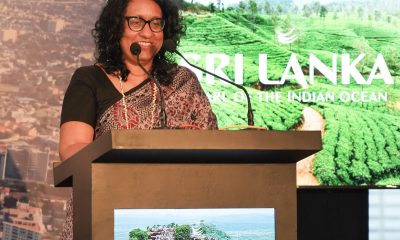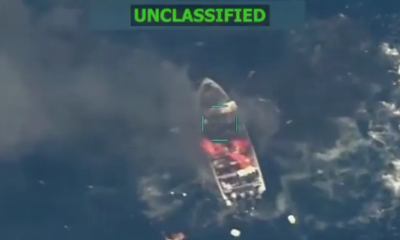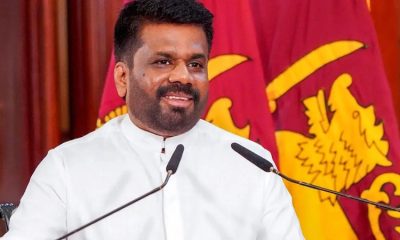Features
Need for more accommodationist policies in the new year
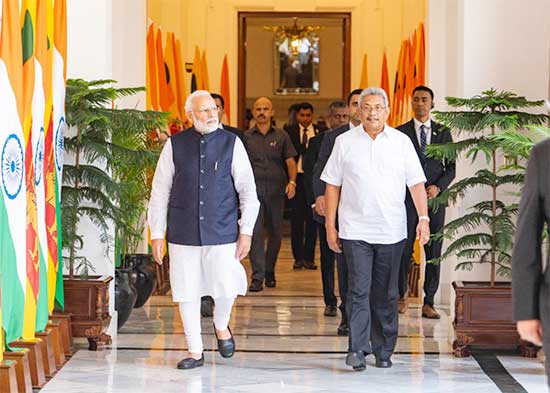
President Gotabaya Rajapaksa with Indian Prime Minister Narendra Modi
By Jehan Perera
As the new year dawns, the government appears to be moving in the direction of more inclusivity in both domestic and foreign policy. The most contentious domestic political issue over the past nine months, and growing in intensity to include public demonstrations, has been that of the disposal of bodies of persons who succumb to the coronavirus. The Sri Lankan claim to be exceptional in the world in respect of the practice of enforced cremation has been met with the opposition and increasingly public agitation of the Muslim community to whom burial is a matter of religious faith and is a human right guaranteed under the constitution and international law. Until recently the experts in the medical and scientific field consulted by the government and elevated to government committees were adamant in taking the position that burials should not be permitted on safety grounds.
The willingness of the government to go ahead for over nine months with a policy that has been challenged both on scientific and religious grounds both locally and internationally needs to be understood. Muslim countries worldwide have joined hands to ask the Sri Lankan government to respect the right to burial. However, the proponents of cremation, both amongst the scientific community and general public, have a worldview that is centered around their own ethnic identity and its historical experiences. They see the need to assert their dominance or risk losing ground as occurred in the distant past. When these primordial fears are set in opposition to those of the ethnic and religious minorities who are vested with equal citizenship rights, and in addition are contrary to international practices, the outcome is bound to be contested, divisive and harmful to the country as a whole.
A more recently appointed expert committee by the government, on the issue of the disposal of bodies of Covid-infected persons has adopted a more pluralist perspective and recommended both cremation and burial as options. This will provide the government with a science-based rationale to change the present policy that has divided the country. It will be to the credit of the government that even as it moves towards accommodation within the country, it is moved to accommodation in the foreign policy sphere as well. The government’s ability to eschew polarization in foreign policy can be seen in its ability to tide over the foreign exchange crisis by negotiating to raise USD 3.5 billion in currency swaps from China and India who are rivals on the international front as well as in relation to Sri Lanka where they have both being vying to take the first place. In recent years the Chinese presence has increased significantly in terms of economic enterprises operating within the country including the country’s ports.
INDIAN SUPPORT
With Sri Lanka being just 30 km away from India and having overlapping territorial seas that can harbour security threats to itself, it can be expected that India would have concerns about Sri Lanka’s growing closeness and dependence on China for both economic and political sustenance. The Sri Lankan government would have no interest in taking sides in the rivalries of China and India and making itself part of a big power struggle by siding with one over the other. The decision to lease out the Eastern terminal of the Colombo port to an Indian-owned company, which is in partnership with the Japanese government, can assuage Indian concerns regarding China’s potential security threat to itself by giving them also a similar presence in the country’s ports. This is a positive action as India is not only physically close to Sri Lanka, but is also culturally close, which makes it the closest to Sri Lanka in more ways than one.
For the past three decades since the signing of the Indo-Lanka Peace Accord of 1987, India has sought to be a benefactor to Sri Lanka offering more and asking for less. The cynical actions of the Indian government in the early to mid-1980s, when it decided to train and arm the Tamil militancy that pushed the country into a protracted ethnic war will always be remembered in Sri Lanka. However, the Indian efforts to make amends needs to be appreciated. During the final decade of the war, India gave its military and diplomatic support to overcome the LTTE threat. The amends that India has made comes in three important ways. The first is economic, in which India has emerged to be among the top three aid donors along with China and Japan. Indian economic support is wide ranging including the construction of railways, providing housing for war victims, ambulances countrywide and educational scholarships. India has also offered to sign a free trade agreement which Sri Lanka has not been prepared to accept so far due to fear of being overwhelmed by much bigger and wealthy Indian economic enterprises.
The second area of India’s support has come in the form of political support in international forums, particularly those in which Sri Lanka is politically vulnerable due to its blemished human rights record due to wars and authoritarian rule when it was capable of doing much better. In the votes taken at the UN Human Rights Council, India invariably voted along with Sri Lanka in opposing international sanctions of any sort being imposed on Sri Lanka. Only once did it abstain from voting for either side in 2014. India’s support has been particularly helpful to Sri Lanka as it provides leadership to other developing countries which tend to look to India for guidance. The forthcoming session of the UNHRC in Geneva in March will be particularly important as the issue of the UNHRC resolution 30/1 of 2015 will be coming up, and the present Sri Lankan government’s unilateral withdrawal from commitments made by the previous government will be taken up.
PROVINCIAL COUNCILS
The third area of Indian support to Sri Lanka has been in regard to supporting a political solution to the ethnic conflict in the country that has dogged it since the time of Independence and which successive government leaders have tried to bring to a conclusion. The current framework of devolution of power which is suited for ethnically and regionally diverse countries such as Sri Lanka is an outcome of the Indo Lanka Peace Accord of 1987. It induced the Sri Lankan government to amend the constitution through the 13th Amendment to establish Provincial Councils. This was a challenge that previous Sri Lankan leaders, starting from S W R D Bandaranaike in 1957 to Dudley Senanayake in 1965, had attempted to do but failed. The early models of devolution of power, which those earlier generations of leaders proposed, would have given the ethnic minorities the power of limited self-government in the areas in which they are a majority. They were akin to asymmetrical devolution as they were not meant to be operational outside of the Northern and Eastern provinces.
It was India’s pledge to stop the ongoing war with the LTTE by disarming it that prompted President J R Jayewardene to give the necessary political leadership to ensure that the 13th Amendment was passed into law. This constitutional amendment provided the framework for devolution of power on a uniform basis to the entire country rather than to the North and East alone on the principle of one country, one law, which the current President Gotabaya Rajapaksa champions. The Provincial Council system has been in operation for over three decades. Those who have been a part of the system and been chief ministers and government officials within them have expressed their belief that this system can be improved. The ethnic minorities, too, support the system of Provincial Councils but the ethnic majority and nationalist politicians are opposed to it.
The decision of the government to further postpone Provincial Council elections till the proposed new constitution is formulated is an indication that the present government or some of its leaders may wish to amend the Provincial Council system or eliminate it entirely. However, there are also other reasons that may have motivated the government to make this decision, including the widening Covid infection and the expense involved in holding the elections which could be used for other urgent purposes. In any event, if the Provincial Council system is to be modified, abolished or replaced with another system of power sharing, this needs to be done with the concurrence of the ethnic minorities and not be unilaterally imposed on them. At a time when Indian is supportive of Sri Lanka it needs also to be kept in mind that India lost the lives of over one thousand of its soldiers to implement the Indo- Lanka Peace Accord, and former Indian Prime Minister Rajiv Gandhi who was the co-architect of the Accord also lost his life as a result. Any change in the system of devolution of power needs to be a considered one.
Features
Reconciliation: Grand Hopes or Simple Steps

In politics, there is the grand language and the simple words. As they say in North America, you don’t need a $20-word or $50-word where a simple $5-world will do. There is also the formal and the functional. People of different categories can functionally get along without always needing formal arrangements involving constitutional structures and rights declarations. The latter are necessary and needed to protect the weak from the bullies, especially from the bullying instruments of the state, or for protecting a small country from a Trump state. In the society at large, people can get along in their daily lives in spite of differences between them, provided they are left alone without busybody interferences.
There have been too many busybody interferences in Sri Lanka in all the years after independence, so much so they exploded into violence that took a toll on everyone for as many as many as 26 (1983-2009) years. The fight was over grand language matters – selective claims of history, sovereignty assertions and self-determination counters, and territorial litigations – you name it. The lives of ordinary people, even those living in their isolated corners and communicating in the simple words of life, were turned upside down. Ironically in their name and as often in the name of ‘future generations yet unborn’ – to recall the old political rhetoric always in full flight. The current American anti-abortionists would have loved this deference to unborn babies.
At the end of it all came the call for Reconciliation. The term and concept are a direct outcome of South Africa’s post-apartheid experience. Quite laudably, the concept of reconciliation is based on choosing restorative justice as opposed to retributive justice, forgiveness over prosecution and reparation over retaliation. The concept was soon turned into a remedial toolkit for societies and polities emerging from autocracies and/or civil wars. Even though, South Africa’s apartheid and post-apartheid experiences are quite unique and quite different from experiences elsewhere, there was also the common sharing among them of both the colonial and postcolonial experiences.
The experience of facilitating and implementing reconciliation, however, has not been wholly positive or encouraging. The results have been mixed even in South Africa, even though it is difficult to imagine a different path South Africa could have taken to launch its post-apartheid era. There is no resounding success elsewhere, mostly instances of non-starters and stallers. There are also signs of acknowledgement among activists and academics that the project of reconciliation has more roadblocks to overcome than springboards for taking off.
Ultimately, if state power is not fully behind it the reconciliation project is not likely to take off, let alone succeed. The irony is that it is the abuse of state power that created the necessity for reconciliation in the first place. Now, the full blessing and weight of state power is needed to deliver reconciliation.
Sri Lanka’s Reconciliation Journey
After the end of the war in 2009, Sri Lanka was an obvious candidate for reconciliation by every objective measure or metric. This was so for most of the external actors, but there were differences in the extent of support and in their relationship with the Sri Lankan government. The Rajapaksa government that saw the end of the war was clearly more reluctant than enthusiastic about embarking on the reconciliation journey. But they could not totally disavow it because of external pressure. The Tamil political leadership spurred on by expatriate Tamils was insistent on maximalist claims as part of reconciliation, with a not too subtle tone of retribution rather than restoration.
As for the people at large, there was lukewarm interest among the Sinhalese at best, along with strident opposition by the more nationalistic sections. The Tamils living in the north and east had too much to do putting their shattered lives together to have any energy left to expend on the grand claims of reconciliation. The expatriates were more fortuitously placed to be totally insistent on making maximalist claims and vigorously lobbying the western governments to take a hardline against the Sri Lankan government. The singular bone of contention was about alleged war crimes and their investigation, and that totally divided the political actors over the very purpose of reconciliation – grand or simple.
By far the most significant contribution of the Rajapaksa government towards reconciliation was the establishment of the Lessons Learnt and Reconciliation Commission (LLRC) that released its Report and recommendations on December 16, 2011, which turned out to be the 40th anniversary of the liberation of Bangladesh. I noted the irony of it in my Sunday Island article at that time.
Its shortcomings notwithstanding, the LLRC Report included many practical recommendations, viz., demilitarization of the North and East; dismantling of High Security Zones and the release of confiscated houses and farmland back to the original property owners; rehabilitation of impacted families and child soldiers; ending unlawful detention; and the return of internally displaced people including Muslims who were forced out of Jaffna during the early stages of the war. There were other recommendations regarding the record of missing persons and claims for reparation.
The implementation of these practical measures was tardy at best or totally ignored at worst. What could have been a simple but effective reconciliation program of implementation was swept away by the assertion of the grand claims of reconciliation. In the first, and so far only, Northern Provincial Council election in 2013, the TNA swept the board, winning 30 out of 38 seats in provincial council. The TNA’s handpicked a Chief Minister parachuted from Colombo, CV Wigneswaran, was supposed to be a bridge builder and was widely expected to bring much needed redress to the people in the devastated districts of the Northern Province. Instead, he wasted a whole term – bandying the claim of genocide and the genealogy of Tamil. Neither was his mandated business, and rather than being a bridge builder he turned out to be a total wrecking ball.
The Ultimate Betrayal
The Rajapaksa government mischievously poked the Chief Minister by being inflexible on the meddling by the Governor and the appointment of the Provincial Secretary. The 2015 change in government and the duopolistic regime of Maithripala Sirisena as President and Ranil Wickremesinghe as Prime Minister brought about a change in tone and a spurt for the hopes of reconciliation. In the parliamentary contraption that only Ranil Wickremesinghe was capable of, the cabinet of ministers included both UNP and SLFP MPs, while the TNA was both a part of the government and the leading Opposition Party in parliament. Even the JVP straddled the aisle between the government and the opposition in what was hailed as the yahapalana experiment. The experiment collapsed even as it began by the scandal of the notorious bond scam.
The project of reconciliation limped along as increased hopes were frustrated by persistent inaction. Foreign Minister Mangala Samaraweera struck an inclusive tone at the UNHRC and among his western admirers but could not quite translate his promises abroad into progress at home. The Chief Minister proved to be as intransigent as ever and the TNA could not make any positively lasting impact on the one elected body for exercising devolved powers, for which the alliance and all its predecessors have been agitating for from the time SJV Chelvanayakam broke away from GG Ponnambalam’s Tamil Congress in 1949 and set up the Ilankai Tamil Arasu Kadchi aka the Federal Party.
The ultimate betrayal came when the TNA acceded to the Sirisena-Wickremesinghe government’s decision to indefinitely postpone the Provincial Council elections that were due in 2018, and let the Northern Provincial Council and all other provincial councils slip into abeyance. That is where things are now. There is a website for the Northern Provincial Council even though there is no elected council or any indication of a date for the long overdue provincial council elections. The website merely serves as a notice board for the central government’s initiatives in the north through its unelected appointees such as the Provincial Governor and the Secretary.
Yet there has been some progress made in implementing the LLRC recommendations although not nearly as much as could have been done. Much work has been done in the restoration of physical infrastructure but almost all of which under contracts by the central government without any provincial participation. Clearing of the land infested by landmines is another area where there has been much progress. While welcoming de-mining, it is also necessary to reflect on the madness that led to such an extensive broadcasting of landmines in the first place – turning farmland into killing and maiming fields.
On the institutional front, the Office on Missing Persons (OMP) and the Office for Reparations have been established but their operations and contributions are yet being streamlined. These agencies have also been criticized for their lack of transparency and lack of welcome towards victims. While there has been physical resettlement of displaced people their emotional rehabilitation is quite a distance away. The main cause for this is the chronically unsettled land issue and the continuingly disproportionate military presence in the northern districts.
(Next week: Reconciliation and the NPP Government)
by Rajan Philips
Features
The Rise of Takaichi

Her victory is remarkable, and yet, beyond the arithmetic of seats, it is the audacity, unpredictability, and sheer strategic opportunism of Sanae Takaichi that has unsettled the conventions of Japanese politics. Japan now confronts the uncharted waters of a first female prime minister wielding a super-majority in the lower house, an electoral outcome amplified by the external pressures of China’s escalating intimidation. Prior to the election, Takaichi’s unequivocal position on Taiwan—declaring that a Chinese attack could constitute an existential threat justifying Japan’s right to collective self-defence—drew from Beijing a statement of unmistakable ferocity: “If Japan insists on this path, there will be consequences… heads will roll.” Yet the electorate’s verdict on 8 February 2026 was unequivocal: a decisive rejection of external coercion and an affirmation of Japan’s strategic autonomy. The LDP’s triumph, in this sense, is less an expression of ideological conformity than a popular sanction for audacious leadership in a period of geopolitical uncertainty.
Takaichi’s ascent is best understood through the lens of calculated audacity, tempered by a comprehension of domestic legitimacy that few of her contemporaries possess. During her brief tenure prior to the election, she orchestrated a snap lower house contest merely months after assuming office, exploiting her personal popularity and the fragility of opposition coalitions. Unlike predecessors who relied on incrementalism and cautious negotiation within the inherited confines of party politics, Takaichi maneuvered with precision, converting popular concern over regional security and economic stagnation into tangible parliamentary authority. The coalescence of public anxiety, amplified by Chinese threats, and her own assertive persona produced a political synergy rarely witnessed in postwar Japan.
Central to understanding her political strategy is her treatment of national security and sovereignty. Takaichi’s articulation of Japan’s response to a hypothetical Chinese aggression against Taiwan was neither rhetorical flourish nor casual posturing. Framing such a scenario as a “survival-threatening situation” constitutes a profound redefinition of Japanese strategic calculus, signaling a willingness to operationalise collective self-defence in ways previously avoided by postwar administrations. The Xi administration’s reaction—including restrictions on Japanese exports, delays in resuming seafood imports, and threats against commercial and civilian actors—unintentionally demonstrated the effectiveness of her approach: coercion produced cohesion rather than capitulation. Japanese voters, perceiving both the immediacy of threat and the clarity of leadership, rewarded decisiveness. The result was a super-majority capable of reshaping the constitutional and defence architecture of the nation.
This electoral outcome cannot be understood without reference to the ideological continuity and rupture within the LDP itself. Takaichi inherits a party long fractured by internal factionalism, episodic scandals, and the occasional misjudgment of public sentiment. Yet her rise also represents the maturation of a distinct right-of-centre ethos: one that blends assertive national sovereignty, moderate economic populism, and strategic conservatism. By appealing simultaneously to conservative voters, disillusioned younger demographics, and those unsettled by regional volatility, she achieved a political synthesis that previous leaders, including Fumio Kishida and Shigeru Ishiba, failed to materialize. The resulting super-majority is an institutional instrument for the pursuit of substantive policy transformation.
Takaichi’s domestic strategy demonstrates a sophisticated comprehension of the symbiosis between economic policy, social stability, and political legitimacy. The promise of a two-year freeze on the consumption tax for foodstuffs, despite its partial ambiguity, has served both as tangible reassurance to voters and a symbolic statement of attentiveness to middle-class anxieties. Inflation, stagnant wages, and a protracted demographic decline have generated fertile ground for popular discontent, and Takaichi’s ability to frame fiscal intervention as both pragmatic and responsible has resonated deeply. Similarly, her attention to underemployment, particularly the activation of latent female labour, demonstrates an appreciation for structural reform rather than performative gender politics: expanding workforce participation is framed as an economic necessity, not a symbolic gesture.
Her approach to defence and international relations further highlights her strategic dexterity. The 2026 defence budget, reaching 9.04 trillion yen, the establishment of advanced missile capabilities, and the formation of a Space Operations Squadron reflect a commitment to operationalising Japan’s deterrent capabilities without abandoning domestic legitimacy. Takaichi has shown restraint in presentation while signaling determination in substance. She avoids ideological maximalism; her stated aim is not militarism for its own sake but the assertion of national interest, particularly in a context of declining U.S. relative hegemony and assertive Chinese manoeuvres. Takaichi appears to internalize the balance between deterrence and diplomacy in East Asian geopolitics, cultivating both alliance cohesion and autonomous capability. Her proposed constitutional revision, targeting Article 9, must therefore be read as a calibrated adjustment to legal frameworks rather than an impulsive repudiation of pacifist principles, though the implications are inevitably destabilizing from a regional perspective.
The historical dimension of her politics is equally consequential. Takaichi’s association with visits to the Yasukuni Shrine, her questioning of historical narratives surrounding wartime atrocities, and her engagement with revisionist historiography are not merely symbolic gestures but constitute deliberate ideological positioning within Japan’s right-wing spectrum.
Japanese politics is no exception when it comes to the function of historical narrative as both ethical compass and instrument of legitimacy: Takaichi’s actions signal continuity with a nationalist interpretation of sovereignty while asserting moral authority over historical memory. This strategic management of memory intersects with her security agenda, particularly regarding Taiwan and the East China Sea, allowing her to mobilize domestic consensus while projecting resolve externally.
The Chinese reaction, predictably alarmed and often hyperbolic, reflects the disjuncture between external expectation and domestic reality. Beijing’s characterization of Takaichi as an existential threat to regional peace, employing metaphors such as the opening of Pandora’s Box, misinterprets the domestic calculation. Takaichi’s popularity did not surge in spite of China’s pressure but because of it; the electorate rewarded the demonstration of agency against perceived coercion. The Xi administration’s misjudgment, compounded by a declining cadre of officials competent in Japanese affairs, illustrates the structural asymmetries that Takaichi has been able to exploit: external intimidation, when poorly calibrated, functions as political accelerant. Japan’s electorate, operating with acute awareness of both historical precedent and contemporary vulnerability, effectively weaponized Chinese miscalculation.
Fiscal policy, too, serves as an instrument of political consolidation. The tension between her proposed consumption tax adjustments and the imperatives of fiscal responsibility illustrates the deliberate ambiguity with which Takaichi operates: she signals responsiveness to popular needs while retaining sufficient flexibility to negotiate market and institutional constraints. Economists note that the potential reduction in revenue is significant, yet her credibility rests in her capacity to convince voters that the measures are temporary, targeted, and strategically justified. Here, the interplay between domestic politics and international market perception is critical: Takaichi steers both the expectations of Japanese citizens and the anxieties of global investors, demonstrating a rare fluency in multi-layered policy signaling.
Her coalition management demonstrates a keen strategic instinct. By maintaining the alliance with the Japan Innovation Party even after securing a super-majority, she projects an image of moderation while advancing audacious policies. This delicate balancing act between consolidation and inclusion reveals a grasp of the reality that commanding numbers in parliament does not equate to unfettered authority: in Japan, procedural legitimacy and coalition cohesion remain crucial, and symbolic consensus continues to carry significant cultural and institutional weight.
Yet, perhaps the most striking element of Takaichi’s victory is the extent to which it has redefined the interface between domestic politics and regional geopolitics. By explicitly linking Taiwan to Japan’s collective self-defence framework, she has re-framed public understanding of regional security, converting existential anxiety into political capital. Chinese rhetoric, at times bordering on the explicitly menacing, highlights the efficacy of this strategy: the invocation of direct consequences and the threat of physical reprisal amplified domestic perceptions of threat, producing a rare alignment of public opinion with executive strategy. In this sense, Takaichi operates not merely as a domestic politician but as a conductor of transnational strategic sentiment, demonstrating an acute awareness of perception, risk, and leverage that surpasses the capacity of many predecessors. It is a quintessentially Machiavellian maneuver, executed with Japanese political sophistication rather than European moral theorisation. Therefore, the rise of Sanae Takaichi represents more than the triumph of a single politician: it signals a profound re-calibration of the Japanese political order.
by Nilantha Ilangamuwa
Features
Rebuilding Sri Lanka’s Farming After Cyclone Ditwah: A Reform Agenda, Not a Repair Job

Three months on (February 2026)
Three months after Cyclone Ditwah swept across Sri Lanka in late November 2025, the headlines have moved on. In many places, the floodwaters have receded, emergency support has reached affected communities, and farmers are doing what they always do, trying to salvage what they can and prepare for the next season. Yet the most important question now is not how quickly agriculture can return to “normal”. It is whether Sri Lanka will rebuild in a way that breaks the cycle of risks that made Ditwah so devastating in the first place.
Ditwah was not simply a bad storm. It was a stress test for our food system, our land and water management, and the institutions meant to protect livelihoods. It showed, in harsh detail, how quickly losses multiply when farms sit in flood pathways, when irrigation and drainage are designed for yesterday’s rainfall, when safety nets are thin, and when early warnings do not consistently translate into early action.
In the immediate aftermath, the damage was rightly measured in flooded hectares, broken canals and damaged infrastructure, and families who lost a season’s worth of income overnight. Those impacts remain real. But three months on, the clearer lesson is why the shock travelled so far and so fast. Over time, exposure has become the default: cultivation and settlement have expanded into floodplains and unstable slopes, driven by land pressure and weak enforcement of risk-informed planning. Infrastructure that should cushion shocks, tanks, canals, embankments, culverts, too often became a failure point because maintenance has lagged and design standards have not kept pace with extreme weather. At farm level, production risk remains concentrated, with limited diversification and high sensitivity to a single event arriving at the wrong stage of the season. Meanwhile, indebted households with delayed access to liquidity struggled to recover, and the information reaching farmers was not always specific enough to prompt practical decisions at the right time.
If Sri Lanka takes only one message from Ditwah, it should be this: recovery spending, by itself, is not resilience. Rebuilding must reduce recurring losses, not merely replace what was damaged. That requires choices that are sometimes harder politically and administratively, but far cheaper than repeating the same cycle of emergency, repair, and regret.
First, Sri Lanka needs farming systems that do not collapse in an “all-or-nothing” way when water stays on fields for days. That means making diversification the norm, not the exception. It means supporting farmers to adopt crop mixes and planting schedules that spread risk, expanding the availability of stress-tolerant and short-duration varieties, and treating soil health and field drainage as essential productivity infrastructure. It also means paying far more attention to livestock and fisheries, where simple measures like safer siting, elevated shelters, protected feed storage, and better-designed ponds can prevent avoidable losses.
Second, we must stop rebuilding infrastructure to the standards of the past. Irrigation and drainage networks, rural roads, bridges, storage facilities and market access are not just development assets; they are risk management systems. Every major repair should be screened through a simple question: will this investment reduce risk under today’s and tomorrow’s rainfall patterns, or will it lock vulnerability in for the next 20 years? Design standards should reflect projected intensity, not historical averages. Catchment-to-field water management must combine engineered solutions with natural buffers such as wetlands, riparian strips and mangroves that reduce surge, erosion and siltation. Most importantly, hazard information must translate into enforceable land-use decisions, including where rebuilding should not happen and where fair support is needed for people to relocate or shift livelihoods safely.
Third, Sri Lanka must share risk more fairly between farmers, markets and the state. Ditwah exposed how quickly a climate shock becomes a debt crisis for rural households. Faster liquidity after a disaster is not a luxury; it is the difference between recovery and long-term impoverishment. Crop insurance needs to be expanded and improved beyond rice, including high-value crops, and designed for quicker payouts. At the national level, rapid-trigger disaster financing can provide immediate fiscal space to support early recovery without derailing budgets. Public funding and concessional climate finance should be channelled into a clear pipeline of resilience investments, rather than fragmented projects that do not add up to systemic change.
Fourth, early warning must finally become early action. We need not just better forecasts but clearer, localised guidance that farmers can act on, linked to reservoir levels, flood risk, and the realities of protecting seed, inputs and livestock. Extension services must be equipped for a climate era, with practical training in climate-smart practices and risk reduction. And the data systems across meteorology, irrigation, agriculture and social protection must talk to each other so that support can be triggered quickly when thresholds are crossed, instead of being assembled after losses are already locked in.
What does this mean in practice? Over the coming months, the focus should be on completing priority irrigation and drainage works with “build-back-better” standards, supporting replanting packages that include soil and drainage measures rather than seed alone, and preventing distress coping through temporary protection for the most vulnerable households. Over the next few years, the country should aim to roll out climate-smart production and advisory bundles in selected river basins, institutionalise agriculture-focused post-disaster assessments that translate into funded plans, and pilot shock-responsive safety nets and rapid-trigger insurance in cyclone-exposed districts. Over the longer term, repeated loss zones must be reoriented towards flood-compatible systems and slope-stabilising perennials, while catchment rehabilitation and natural infrastructure restoration are treated as productivity investments, not optional environmental add-ons.
None of this is abstract. The cost of inaction is paid in failed harvests, lost income, higher food prices and deeper rural debt. The opportunity is equally concrete: if Sri Lanka uses the post-Ditwah period to modernise agriculture making production more resilient, infrastructure smarter, finance faster and institutions more responsive, then Ditwah can become more than a disaster. It can become the turning point where the country decides to stop repairing vulnerability and start building resilience.
By Vimlendra Sharan,
FAO Representative for Sri Lanka and the Maldives
-

 Business4 days ago
Business4 days agoAutodoc 360 relocates to reinforce commitment to premium auto care
-

 Midweek Review4 days ago
Midweek Review4 days agoA question of national pride
-

 Opinion3 days ago
Opinion3 days agoWill computers ever be intelligent?
-

 Midweek Review4 days ago
Midweek Review4 days agoTheatre and Anthropocentrism in the age of Climate Emergency
-

 Editorial6 days ago
Editorial6 days agoThe JRJ syndrome
-
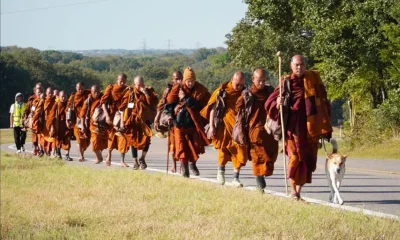
 Opinion4 days ago
Opinion4 days agoThe Walk for Peace in America a Sri Lankan initiative: A startling truth hidden by govt.
-

 Foreign News6 days ago
Foreign News6 days agoPortugal elects Socialist Party’s Seguro as president in landslide
-

 Foreign News7 days ago
Foreign News7 days agoWashington Post chief executive steps down after mass lay-offs






